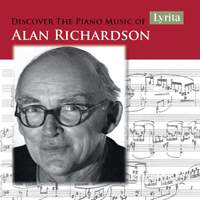Introduction
Alan Richardson, a distinguished British composer and pianist, left an indelible mark on the world of classical music during the 20th century. His compositions, ranging from solo piano works to orchestral pieces, have enriched the musical landscape and continue to be performed and appreciated today.
Early Life and Education
Born on February 29, 1904, in Edinburgh, Scotland, Alan Richardson showed an early aptitude for music. Growing up in a musical family, he was exposed to various instruments and musical styles from a young age. His father, a professional musician, recognized his son’s talent and encouraged his musical pursuits.
Richardson began his formal music education at the Royal Academy of Music in London, where he studied piano and composition. His time at the Academy was marked by exceptional achievements, including winning several prestigious awards for his compositions and performances.
Career and Musical Style
After completing his studies, Richardson embarked on a multifaceted career as a composer, pianist, and teacher. His compositional style evolved throughout his life, reflecting both the musical traditions he inherited and the changing landscape of 20th-century classical music.
Richardson’s music is characterized by:
Lyricism: His works often feature beautiful, singing melodies that showcase his gift for crafting memorable tunes.
Harmonic Sophistication: While rooted in tonality, Richardson’s harmonic language incorporates elements of modernism, creating a unique and engaging sound world.
Rhythmic Vitality: Many of his compositions display a keen sense of rhythm, often drawing inspiration from Scottish folk music.
Instrumental Virtuosity: As an accomplished pianist himself, Richardson wrote works that showcase the technical and expressive capabilities of the instruments he composed for.
Famous Works
Piano Compositions
Richardson’s output for solo piano is particularly noteworthy. Some of his most celebrated piano works include:
“Sonatina in C major”: A charming three-movement work that combines classical form with Richardson’s distinctive melodic style.
“The Dreaming Spires”: Inspired by the architecture of Oxford, this piece showcases Richardson’s ability to create evocative musical landscapes.
“Three Pieces for Piano”: A set of character pieces that demonstrate Richardson’s range as a composer, from lyrical introspection to virtuosic display.
Chamber Music
Richardson made significant contributions to the chamber music repertoire, composing for various instrumental combinations. Notable works include:
“Sonata for Viola and Piano”: A substantial work that explores the rich tonal possibilities of the viola, paired with an equally demanding piano part.
“String Quartet in G minor”: This composition showcases Richardson’s skill in writing for string ensemble, balancing intricate counterpoint with expressive melodies.
“Trio for Flute, Viola, and Piano”: An innovative combination of instruments that highlights Richardson’s ability to create unique timbral blends.
Orchestral Works
While less prolific in the orchestral realm, Richardson did compose several works for large ensemble:
“Scottish Dances”: A suite of orchestral pieces that draw on traditional Scottish dance forms, infused with Richardson’s personal style.
“Concerto for Piano and Orchestra”: A substantial work that showcases Richardson’s pianistic background and his skill in orchestration.
Vocal and Choral Compositions
Richardson also wrote for voice, both in solo and choral settings:
“Five Burns Songs”: A collection of art songs setting the poetry of Robert Burns, demonstrating Richardson’s affinity for Scottish literature and culture.
“Magnificat and Nunc Dimittis”: A setting of these traditional Anglican canticles, composed for choir and organ.
Contributions to Music Education
Teaching Career
In addition to his work as a composer, Alan Richardson was a dedicated and influential teacher. He held positions at several prestigious institutions, including:
The Royal Academy of Music: Richardson returned to his alma mater as a professor of piano and composition, shaping the next generation of musicians.
Morley College: As a tutor at this London adult education center, Richardson played a role in bringing music education to a wider audience.
Educational Compositions
Recognizing the importance of accessible music for developing musicians, Richardson composed numerous pieces specifically for educational purposes:
“Technical Exercises for Piano”: A collection of études designed to address specific pianistic challenges.
“Easy Pieces for Violin and Piano”: Compositions that introduce young violinists to chamber music playing while developing their technical skills.
Legacy and Impact
Alan Richardson‘s contributions to British music extend beyond his compositions. His work as an educator and his commitment to creating music for performers at all levels have ensured a lasting impact on the musical landscape.
Influence on British Music
Richardson’s compositions, with their blend of traditional forms and modern sensibilities, helped to define a distinctly British musical voice in the 20th century. His incorporation of Scottish elements into classical forms contributed to the preservation and evolution of Scotland’s musical heritage.
Continued Performances and Recordings
Many of Richardson’s works continue to be performed and recorded today, particularly his piano and chamber music compositions. These performances help to introduce new generations of musicians and listeners to his unique musical voice.
Preservation of Manuscripts
The Alan Richardson Archive, housed at the Royal Academy of Music, contains a wealth of manuscripts, sketches, and personal papers. This collection serves as a valuable resource for musicologists and performers studying Richardson’s life and works.
Conclusion
Alan Richardson’s life and career exemplify the multifaceted nature of a 20th-century composer. His ability to balance tradition with innovation, coupled with his dedication to music education, has secured his place in the pantheon of British composers. As performers and scholars continue to explore his works, Richardson’s music remains a vibrant part of the classical repertoire, inspiring and delighting audiences with its lyrical beauty and technical sophistication.

